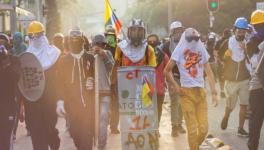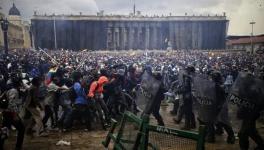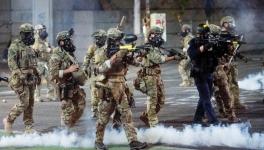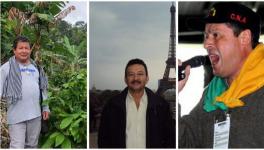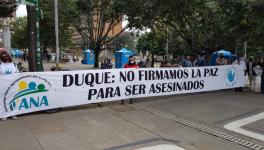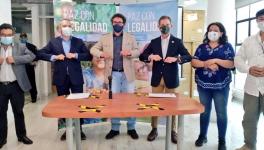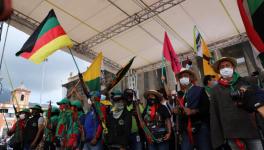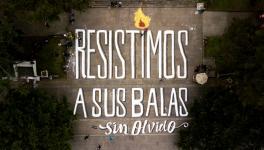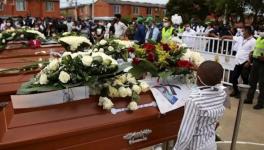Indigenous Movements in Colombia Declare a State of Emergency Over Assassinations
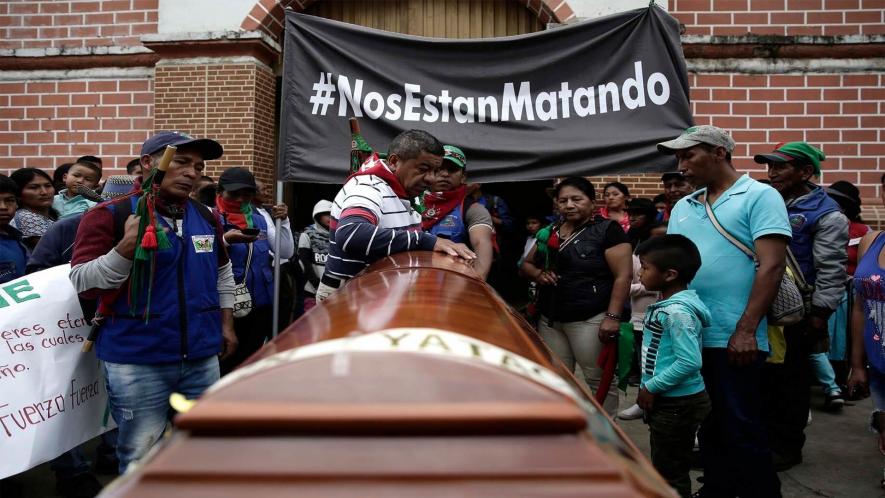
Indigenous Guardia attends the funeral of Gersaín Yatacué who was assassinated on August 1 in Caloto, Cauca. The banner reads: "They are killing us". Photo: Twitter
On August 10, a day after the International Day of Indigenous Peoples, an armed group attacked a bus transporting members of the Indigenous Guardia who were accompanying a local coffee fair in Toribío, North Cauca, in the south-west of Colombia. Two members of the Indigenous Guardia, Kevin Ademir Mestizo and Senior Tenorio, died from bullet wounds and six were badly injured.
The tragic incident was met with outrage from Indigenous and social movements across Colombia and the hashtag #ParenElGenocidioIndígena (#StopTheIndigenousGenocide) was trending the following day.
The National Indigenous Organization of Colombia (ONIC) reported that since Ivan Duque took office a year ago on August 7, 2018, 97 members of Indigenous communities have been assassinated. The threats and harassment of the communities has also greatly increased after the Minga mobilization that Indigenous, Afro-descendant and peasant communities of the south west of Colombia carried out in March and April. The ONIC also condemned the fact that in Colombia, more than 80 Indigenous groups are at risk of extinction, with the growing violence, forced displacement and systematic denial of the rights of these communities as key contributing factors.
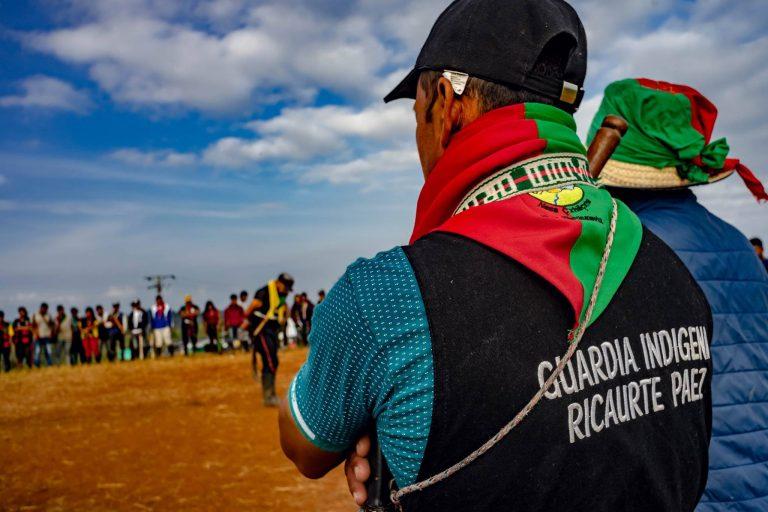
Members of the Indigenous Guard participate in activity as part of the Minga for the Defense of Life, Territory, Democracy, Justice and Peace in March and April. Photo: CRIC
The Regional Indigenous Council of Cauca (CRIC) wrote in a statement “The persistence and increase of violent acts with high levels of theft, assassination attempts, assassinations, threats, disappearances and recruitment of youth [to armed groups] affect our communities and our exercises of territorial control. The institutional response has been insufficient, the capacity of the government appears to be overwhelmed, and at the same time, we observe with worry the complicity of public servants and members of the public force.”
Due to this alarming situation, CRIC has declared a state of emergency and permanent assembly in all of Cxhab wala kiwe territory (the Northern region of Cauca). They called on the national government to engage in dialogue with the communities of the region to address the situation.
The day before the assassinations, on August 9 in Pajarito, Caloto municipality, North Cauca, next to Toribío municipality, the Indigenous communities had made an urgent call to the Indigenous Guardia when they found explosive artifacts that were a risk to the population. When the Guardia mobilized at the location to ensure the protection of the community, they were shot at with firearms by unidentified individuals.
On August 1, Gersain Yatacue from the Toribío municipality in North Cauca and a member of the Indigenous Guardia, was in Pajarito when two armed men on a motorcycle began to follow him, intercepted him and shot him dead.
A few days later on August 4, Enrique Guegia, a traditional Indigenous doctor and president of a Community Action Board from Toribío, Cauca was shot and killed by armed men on a motorcycle. Harold Secué, a representative from the Association of Indigenous Councils of North Cauca (ACIN), reported that Guegia had been traveling to participate in an activity in honor of Gersaín Yatacupe.
The humanitarian crisis in Colombia has escalated not only for Indigenous communities in Colombia, but for all those who fight for peace, structural changes and rights. Human rights organizations estimate that over 800 social leaders, human rights defenders and ex-combatants from the Revolutionary Armed Forces of Colombia and their family members have been assassinated since 2016. This crisis appears to have exacerbated under the leadership of Ivan Duque.
*The Indigenous Guardia is a process from the Indigenous communities of North Cauca of organization and territorial protection. The Guardia is an ancestral organism and an instrument of resistance, unity and autonomy in defense of the territory and the plan of life of the Indigenous communities. It is not a police structure, but a humanitarian mechanism and of civil resistance. While the members of the Guardia are tasked with the defense of their people from actors that attack them, they only use a baton to defend.
Get the latest reports & analysis with people's perspective on Protests, movements & deep analytical videos, discussions of the current affairs in your Telegram app. Subscribe to NewsClick's Telegram channel & get Real-Time updates on stories, as they get published on our website.










